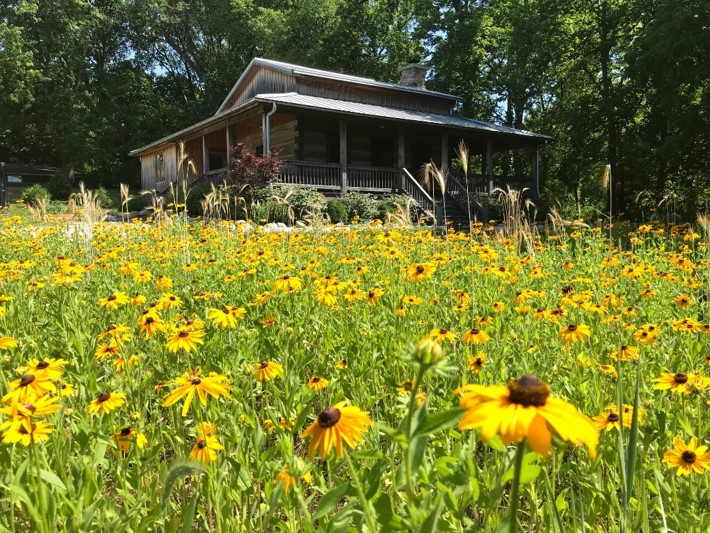
Honoring the past and setting our sights on a bold vision for the next 50 years … and beyond.
Environmental studies at Manchester University will celebrate 50 years of observing and improving the natural world at Homecoming 2022.
Last year’s Homecoming featured a virtual panel to observe the anniversary, and this year’s celebration will take place in person at the Environmental Studies Cabin on the North Manchester campus.
Suzanne Beyeler, associate professor of biology and director of environmental studies, plans to feature food that is locally produced to “highlight the need to think more about sustainable ways of living off of your landscape.”
The Homecoming program will highlight the role of environmental studies in inspiring change and honor the history of the program itself.
Environmental studies at Manchester began in 1971, not long after the first Earth Day, and it is among the oldest such programs in the nation. It was spearheaded by William Eberly ’48, biology alumnus and professor emeritus of biology, who devoted three years to writing The History of the Natural Sciences at Manchester College. The proposal to establish the program was crafted by Eberly; Roger Buzzard, professor emeritus of history and economics; and Allen Deeter ‘53, professor emeritus of religion and philosophy and director of the peace studies program.
“It was visionary to start this program in the early ’70s,” Beyeler said. “They were way ahead of their time and brave enough to push environmental studies as a program at a time when not many other schools were doing it.”
Although Eberly was a scientist, the program he helped found did not focus solely on basic science – the three original tracks were natural history, which was based in biology; policy, which focused on the economic and political perspective; and technical, which leaned into chemistry. An ordained minister in the Church of the Brethren, Eberly included courses that emphasized the moral dimension of environmental concerns.
“He understood that environmental studies should be interdisciplinary because while every environmental issue involves science, it also includes economics and social science,” said Jerry Sweeten ’75, one of the first students to enter the program and director of environmental studies from 2006 to 2017. “Humans are a big part of the equation.”
Beyeler took over as director of the environmental studies program in 2017 after spending eight years as a research scientist and the biodiversity monitoring program director at Cornell University. When asked why she wanted to teach at Manchester University, Beyeler said it was an easy decision. “The mission of the university, the hands-on design of the environmental studies major, and the opportunity to collaborate with the strongest undergraduate peace studies program in the country were all very appealing. This is exactly the place I wanted to be.”
One thing that environmental studies prides itself on is giving students opportunities to gain hands-on experience through real-world projects.
In 1974, when Manchester was given the Koinonia Environmental and Retreat Center, Eberly set his students to projects in the forests, lake, prairie and wetlands on the approximately 100-acre site. Sweeten gave students opportunities to study the Eel River, which flows alongside the North Manchester campus. This initiative resulted in four low-head dams being removed from the river and the reintroduction of an endangered species of mussel. Students also worked with local farmers to study nutrient and sediment pollution, and how the effects can be mitigated to benefit agriculture and the environment.
This project-based tradition continues under Beyeler’s direction. Students assist Beyeler with her work on the endangered Blanding’s turtle, attaching tracking devices on the turtles to see where they nest and better know how to protect them and their habitat. Other recent projects focus on wetlands, green infrastructure and the effect of environmental degradation on small mammals, songbirds and salamander populations.
“We have been able to support a wide range of research and internship projects by expanding on our partnerships with the broader community,” Beyeler said. “Our students are completing the type of work you would expect at a large research institution. Impactful work that is helping to restore the balance of nature.”
As the first 50 years of the program draw to a close, Beyeler is looking eagerly toward the future. She hopes those who attend the Oct. 22 celebration can be part of that discussion.
Plans include establishing the Center for Environmental Resiliency and Social Engagement, a collaboration between environmental studies and peace studies that will work with community partners to promote social justice and sustainability, and updating the environmental studies major to include environmental health, sustainability and wildlife ecology.
Beyeler also plans to convert some of Manchester’s open spaces on campus into gardens that will help combat food insecurity and unhealthy diets in the MU and North Manchester communities.
Most of all, Beyeler is committed to educating Manchester students, regardless of major, on the importance of environmental studies.
“We all benefit from a healthy environment. We all have a role to play in restoring the balance of nature. It’s my hope that every student that attends Manchester University will leave with a vision for how they can support a more sustainable future for our planet.”
–Student Carly Greaves